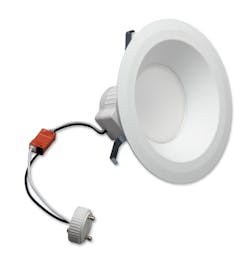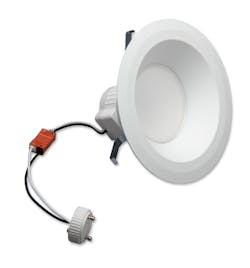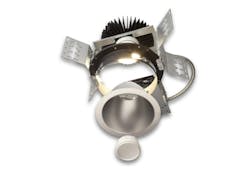GE Lighting has announced extensions to both the Lumination RS and DI series of LED-based downlight products. The RS series is targeted at retrofit scenarios and the new products can easily replace incandescent, halogen, or fluorescent lamps in existing ceiling cans. The DI Series, meanwhile, is based on the GE Infusion modular light engine and the additions to the product line are primarily in new configurations and finishes.
Retrofit-targeted products such as the Lumination RS series take a variety of approaches to handling the electrical connection in existing can fixtures. GE had previously announced RS-family products that screw directly into the existing electrical socket that has hosted legacy lamps. The new RS products use a wiring pigtail to handle the connection to multiple types of existing sockets.
Indeed as the nearby photo illustrates, the pigtail can be adapted using the inline connector. The photo shows a connection intended for pin-based lamps. But the new series supports traditional Edison screw-based sockets as well.
"With even easier installation than before, Lumination RS Series LED Downlights help reduce labor expenses while saving time," said GE indoor LED fixture product manager John Koster. "This simplicity, combined with the long life of LED lighting, makes them the perfect choice for retrofits in homes and low ceilings commercial building applications."
The products are available in 4- and 6-in. versions and deliver 700 lm at 70-lm/W efficacy. GE offers the products at a choice of 2700K or 3000K CCTs, and a CRI of 80. The downlights are rated for 35,000 hours of life.
Lumination DI Series
The DI Series of downlights, meanwhile, are targeted at architectural specification in new construction. The product line was announced in late 2013 and was noteworthy at the time for the product design that is based on a modular Infusion light engine that's compatible with the Zhaga Consortium Book 5 specification for socketable light engines. The 4- and 6-in. products are available in round and square versions.
The Infusion module has provided flexibility in terms of lumen output, CCT, and CRI from the start and GE continues to evolve those options. But the new announcement covers options in reflector finishes and anodized color options.
"GE's Lumination DI Series LED Downlights come in a wider range of finishes and colors -- from wheat, semi-diffused and white colors to specular, clear and even black -- giving designers and architects more versatile options than ever before," said Koster. "Adding in the Infusion technology, which provides outstanding efficacy and color rendering, including high R9 values across all color temperatures, this truly is the ideal downlight solution for retail spaces and other areas where the color, richness, and detail of merchandise and key interest areas can pop."
The modular design means that GE can offer the products as an alternative to 13W CFL downlights up to 100W metal halide (MH) downlights. Lumen packages range from 1000 to 4000 lm.
GE also uses the Infusion technology in the RI Series of downlights announced early this year. That product family includes 6-, 8-, and 10-in. diameter products and can serve in high-ceiling applications.








